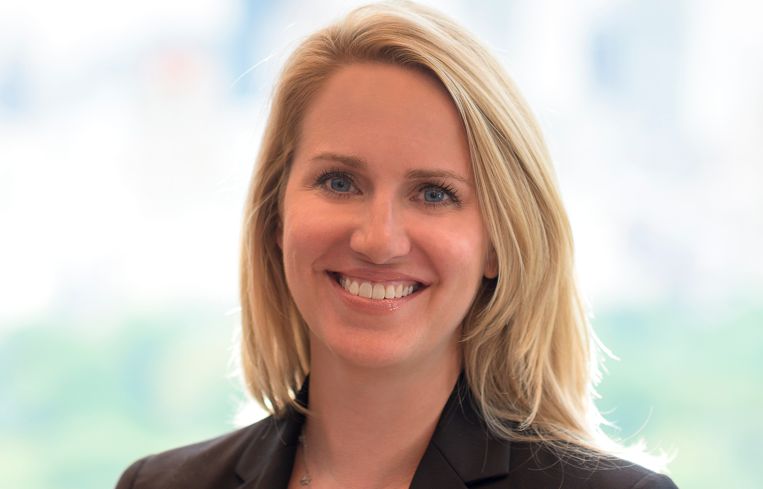Related’s Amy Arentowicz Talks Hudson Yards
By Larry Getlen September 7, 2016 5:00 pm
reprints
As a vice president and the general counsel for Hudson Yards, Amy Arentowicz is not just a lawyer—she’s a full-on participant in the building of what feels like an entirely new city.
Arentowicz, who grew up in Millington, N.J., and currently resides in Chelsea, graduated from Notre Dame in 1998, then worked briefly at Skadden, Arps, Slate, Meagher & Flom as a paralegal. That time helped her realize that her passion would be found in transactional, not litigation, law. After receiving a degree from Seton Hall University School of Law in 2002, she joined Greenberg Traurig, eventually making partner in the real estate group. But fearing the encroachment of boredom, she joined Related Companies in 2012 and has been working there ever since on the development of Hudson Yards—an opportunity she has found exciting, to say the least. Arentowicz spoke to Commercial Observer about her career and what it’s like helping to build a city within a city.
Commercial Observer: What are some of the most surprising or fascinating things about seeing a mini-city being built?
Arentowicz: It’s amazing to me how many people you need on a daily basis to manage the cost and permitting processes. It’s unappreciated. The permitting process was eye-opening because we’re not just building one building on a block; we’re building a building connected to an entire platform with buildings that connect to each other. Our project was the first in a long while to get a three-dimensional tax lot. It’s one building from the Department of Buildings standpoint, but from a financing standpoint, it’s a condominium with two separate condo units that were collateralized separately. There’s so much to plan and think about, from the aesthetic to the legal.
Related recently closed on a $690 million loan for 30 Hudson Yards. How did that deal come about?
The incredible feat of Related is that we’ve closed many of these loans in the last four years. I started here in June 2012. The company, along with our partner Oxford Properties Group, has been amazing at being able to capitalize all of Hudson Yards within a four-year span. The latest is this loan we closed on Aug. 1 with Deutsche Bank, but personally, I think the greater story is the ability of our company to keep getting these loans and closing them. Our entire project is now capitalized and under construction.
What is the secret to that success?
I think it’s our track record—we’ve proven ourselves in the market. Plus, everyone at Related inspires you on a day-to-day basis to get this stuff done and closed. Everyone who works on Hudson Yards believes that we’re all doing something good for the city of New York.
What’s the story behind that particular loan?
The way Hudson Yards works is each of the buildings is looked at on an asset-by-asset basis. Our deal with the Metropolitan Transportation Authority is [this]: Once you hit substantial completion of a building, you can acquire a fee simple title. There was a 99-year ground lease on 10 Hudson Yards, and once you hit substantial completion, you can get off the ground lease from the MTA and purchase a fee simple title. The thinking was, what’s the best strategy to recapitalize 10 Hudson Yards and purchase the fee simple title from the MTA?
There’s a lot of international money coming into Hudson Yards. What countries is it coming from?
It’s kind of all over the place—China, Germany and with Oxford—we can’t forget them, our 50/50 partners—Canada.
Why are foreign investors looking to invest in Hudson Yards?
I think it’s the continued and proven success of Related and that the project itself is intriguing in that we’re revitalizing the West Side of Manhattan. We have credit-worthy tenants signed up and big names—Coach, L’Oreal, Time Warner. When we close the recapitalization of Tower C [by year’s end], we’re essentially 100 percent leased. I think we can attract a broad spectrum of talent and companies to relocate to the yards, and that has a huge impact on our ability to bring in different capital forces.
How complicated does it get with the different tax structures in use for foreign investors?
You can layer that on from day one. Our partner [Oxford] is Canadian, and they have pensioners’ money, so they like to structure things tax-efficiently. But then you throw in other foreign investors, at least for 10 Hudson Yards, and that structuring is very complicated. We rely heavily on our tax team and our general counsel in figuring out the most tax-efficient structure for recapitalization. It’s complicated—lots of tax lawyers in the room.
What’s your favorite part of the job?
I love the deal stuff but also the added elements of being able to work more collaboratively. Sometimes when you’re [working] at a law firm, behind your desk and drafting documents, you do not get to see the full picture on the development side. So the thing I enjoy most is working collaboratively with our development managers on a daily basis, planning the project and dealing with issues that come up daily vis-à-vis the construction or leasing sides. I think some of that big team element is there in a law firm, but what’s missing is you don’t get to participate on the other side of it, where you see how a deal goes from start to finish; on top of it, from the business side structuring, from the chief executive officer to the development managers; then outside of that, how the project is run day-to-day, from dealing with our construction guys to the development guys to outside consultants.



